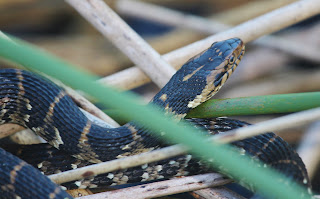The banded water snake, scientifically known as Nerodia fasciata, is a species of non-venomous snake found in the southeastern United States, including Georgia. It is commonly encountered near bodies of water such as lakes, ponds, rivers, and marshes. Here are some key details about the banded water snake:
1. Appearance: The banded water snake has a robust body that can grow up to 4 to 5 feet in length, although females are usually larger than males. It has a dark-colored back with a combination of brown, black, or reddish-brown bands that run horizontally across its body. The bands may vary in color and thickness, which helps with their camouflage.
2. Habitat: This species prefers to inhabit freshwater environments, such as swamps, wetlands, and slow-moving streams. In Georgia, you can find them near various bodies of water, including rivers like the Chattahoochee River, coastal marshes, and reservoirs like Lake Lanier.
3. Behavior: Banded water snakes are primarily nocturnal and semiaquatic, which means they are well adapted to both land and water. They are excellent swimmers and climbers and are known for being relatively docile snakes if not threatened. However, they may release a foul-smelling musk and bite if they feel threatened or cornered.
4. Diet: These snakes are opportunistic carnivores, feeding mainly on fish and amphibians such as frogs, tadpoles, and salamanders. They may also consume small reptiles, crustaceans, and invertebrates found near the water's edge.
5. Reproduction: Banded water snakes are ovoviviparous, which means the females retain and nourish the eggs internally until live young are born. Mating occurs in the spring, and females give birth to 8-30 live offspring in late summer or early fall. The young snakes are fully formed and independent at birth.
6. Ecological Role: Banded water snakes play a beneficial role in the ecosystem by helping to control populations of their prey species. As predators of fish and amphibians, they help maintain a balance in these aquatic environments.
It's important to note that while banded water snakes are not venomous, they can resemble the venomous water moccasin (cottonmouth), leading to mistaken identity. Therefore, it is wise to exercise caution and avoid handling any snake unless you are familiar with the species.







0 Comments